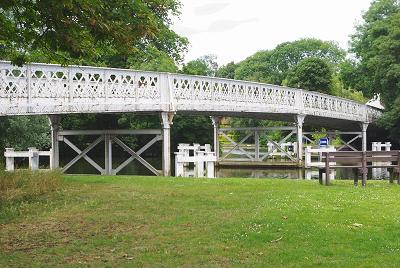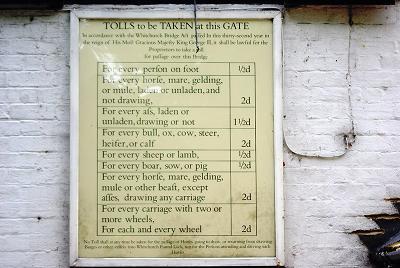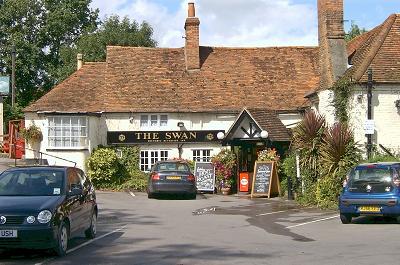Whitchurch and Pangbourne
 Whitchurch Bridge
Whitchurch Bridge
In a way Whitchurch and Pangbourne are similar to Streatley and Goring. Both locations have villages on either side of a crossing.
Whitchurch Bridge is the second, and last, of the two toll bridges still operating on the river. It is owned by The Company of Proprietors of Whitchurch Bridge and was built in 1902. The company is empowered by Acts of Parliament to collect tolls at any time of day or night. There are plans to rebuild the bridge in 2013.
 Tarrif Board, Whitchurch Bridge
Tarrif Board, Whitchurch Bridge
I stop and take some notes from the historic tariff poster on the side of the road. Pedestrians, sheep, pigs and boars were charged at 1/2d each, and carriages were rated at 2d for every wheel, a somewhat intriguing charge that must have had a good reason at the time. Modern day cars are charged at 20p, which includes all four wheels. Since decimalisation in 1971 pedestrians have been granted free passage, enabling me to cross the bridge with a clear conscience instead of trying to slip unnoticed around behind the back of the quaint toll-booth which is what I expect everybody tried to do before.
On the bridge there is a marvellous upstream view. The church spire provides a focal point above honey-coloured houses visible through a gap in the trees. The river runs alongside and reflects the buildings on its surface. I have a quiet bet with myself that those houses with their wonderful location will not be within the limits of my budget.
 The Swan, Pangbourne
The Swan, Pangbourne
The Swan Inn at Pangbourne is a lovely establishment. It is situated right on the bank of the river, about as close as you could possibly get. The inn is 18th century, and is far larger on the inside than it first looks. A magnificent terrace provides a perfect setting for a well deserved lunch.
Once upon a time the Swan Inn sat exactly on the county boundary-line dividing Berkshire and Oxfordshire, and consequently each end of the bar was officially in a different county. These two counties had different licensing hours, and drinkers would move across the border for some extra drinking time when their own county called for last orders. No such problem existed for the regulars at the Swan. When the landlord called “Time Gentlemen please” they simply picked up their drinks and moved to the other end of the bar where they could continue to imbibe without the landlord getting his collar felt.
Finally, it was at the Swan Inn at Pangbourne that Jerome, George and Harris finally admitted that they had endured enough of rowing the River Thames. They looked at each other as they sat in the bar, said “Sod this for a game of soldiers” and went home.
< Previous Page | Next Page >